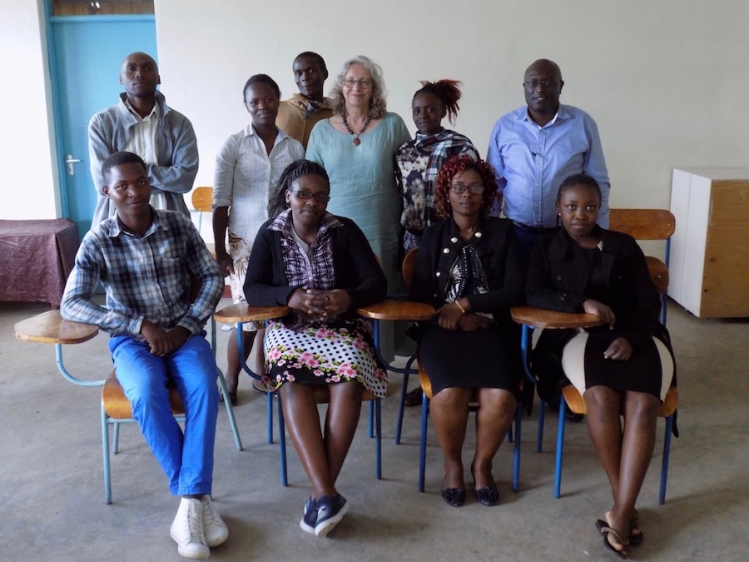School
The autumn term saw an increase in the number of children at the school at New Canaan: 140 in the Children’s House and 12 in Elementary, bringing to a total of 152. With the school registration almost complete, more parents have allowed their children to move into the pilot elementary environment instead of leaving for other schools.
We are working with our partners on-ground to track the registration process whilst work is underway to officially begin enrolment for the elementary class in January 2019.
The school at Kisima maintained steady numbers between 75 to 80 children on roll during the term. Continuing from last year, the term closed with 16 children being enrolled at Kenana Primary, a local primary school, that is the only other school in the area. Kenana often turn away children due to lack of space and facilities for the growing number of pupils, but were keen to have the Corner of Hope children.
It is hoped that once the Kisima land subdivision is completed and public utility land allocated, Corner of Hope can begin an elementary classroom for the community. This will provide a progress pathway to the children and also alleviate the capacity issues at Kenana, who are keen to work with Corner of Hope in the establishment of better schooling in the area.
Training
The 2017 Corner of Hope cohort of eight trainees has successfully completed the attachment year and will graduate early November. The 2018 cohort is preparing to start their attachment next year. Except for one trainee, all have completed their coursework and materials.
Interviews for the 2019 cohort from the New Canaan and Kisima communities are scheduled for later in the month. The selection process is being revised to ensure that the interview panel is well-balanced with representation from the school, college and the community.
The Kenya Montessori 3-6 Curriculum being validated by the Kenya Institute of Curriculum Development (KICD) is a significant achievement. The National Montessori Diploma programme, offered at the three Montessori Teachers Association of Kenya (MTAK) colleges – Nakuru, Nairobi and Mombasa – supported by AMI, will now be the only Montessori teacher training approved by the Ministry of Education. All diploma graduates from the three colleges will be able to register with the government for a Teacher Service Commission (TSC) Number, which allows them to work in any school at the nursery and primary levels.
Elementary teachers and trainers Eileen Spalla (USA) and Poinsy Pino (UK) are also working on preparing the Kenya Montessori 6-12 Curriculum for submission to the KICD in the coming year. They continue to remotely mentor and support the National Elementary Course graduates in Kenya and Tanzania.
Demand for graduates from the Corner of Hope community is growing. Two Corner of Hope elementary graduates are now working in a private Montessori school and one is working in a Diocesan school. Recruitment enquiries continue to pour in, not just from Kenya but also Uganda, Tanzania, even as far as Cameroon.
Teachers – Professional Development
The ‘upskilling’ initiative, supported by generous individual donors, is starting to gain ground. The 5 trainees (4 from Nakuru and 1 from Nairobi) on the AMI 3-6 Diploma course in Tanzania are starting to extend their learning to their colleagues at their schools and colleges. They are preparing for the next module from November – December 2018.
Corner of Hope senior teacher Judy Mugambi and teacher Terry Koskei are training as mentor-teachers through their work as part of the Montessori Samburu initiative in Northern Kenya.
Beth Kosgei, one of the tutors from St Ann’s Montessori Teacher Training College in Nakuru and Terry Koskei represented the Corner of Hope programme at the 2018 EsF Assembly held in August in South Africa.
Offshoots
Montessori Samburu: The team of four teachers (2 senior teachers from Corner of Hope and 2 Samburu trainees on attachment) continued working with the communities at the Ntaparani and Tintil settlements in the Namunyak Conservancy. The children and parents are very engaged with the Montessori environments despite being temporary.
The school building construction has obtained government support. However, due to the complex communal relationships and land rights issues, it will be advanced to next year to ensure full community commitment that is central to the programme’s success.
Montessori for Kenya: The Kenya NGO Coordination Board has yet to respond on the application for registration as an NGO. Plans are underway to conduct a landscape analysis of all actors and stakeholders of Montessori education in Kenya, which includes making initial contact with AMI and MMI alumni in East Africa. A website and social media presence for the organisation is also being designed.

